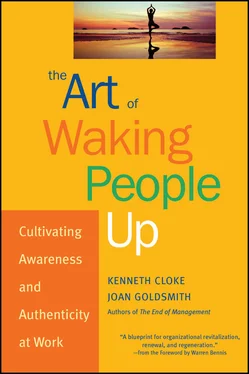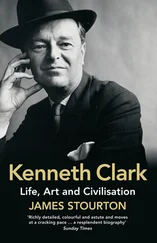We may be frightened that change will deprive us of jobs or income, or eliminate our role or source of identity, or undercut our self-confidence, or unsettle a precarious idea about who we are. We may be convinced that we will never be understood or appreciated for who we are. We may distrust our organizational environments so much that we cannot imagine anything ever changing, except by getting worse. We may have unresolved insecurities or doubts from our families of origin that keep us locked in unhappy relationships and feeling doubtful about our capacities. We may simply lack the personal skills or organizational supports we need to risk doing something that could radically change our lives.
In fact, it is not change that we resist, but what change implies. We resist the loss of what is familiar, the uncertainty surrounding anything new, the insecurity about who we are when the things with which we have identified no longer define us. Waking up and cultivating awareness and authenticity reduce this resistance by revealing a deeper identity that is not bound up in the past or future, or in what is constantly changing.
The Limitations of Roles and Expectations
When we become frightened of these aspects of change, we defend ourselves against learning, resist receiving honest feedback, hide behind roles, become inauthentic, cease being fully awake, and grow insensitive to what is happening around and inside us. We fight to preserve what is familiar, thinking we are protecting our power or image. Yet in doing so, we diminish our capacity for honesty and empathy with ourselves and others. Eventually we become stuck and unable to grow. Whatever our role, at a subtle level, power, ego, and resistance to change are increased by identifying personally with it, while honesty, authenticity, and openness to change are diminished.
In truth, these self-defining roles do not exist—nor, at a human level, do organizations, job titles, hierarchies, or status. They are figments of our imaginations—constructs, hypnotic images, mirages, phantoms, fetishes, and hallucinations that distance us from what is real and from each other. Every role is inauthentic, simply because it captures only a part of what we do and largely ignores who we are. Yet we invest these images with the power to control our lives, twisting them gradually into conformity with other people’s expectations and losing our capacity for self-definition.
In Fraud , a novel by Anita Brookner, a woman tells a friend, “Fraud was what was perpetrated on me by the expectations of others. They fashioned me in their own image, according to their needs.” People become inauthentic and fraudulent by hiding the most interesting, human parts of themselves behind masks and roles, revealing only what they hope others will find acceptable. This is a kind of sleep from which anyone can awaken at any time, even after years of accommodation. To do so requires cultivating awareness, authenticity, congruence, and commitment in ourselves, in others, and in organizations.
However we describe ourselves, whatever roles we assume, they do not touch the deepest parts of ourselves. In addition, in all our descriptions, there is an “I” that is describing “Myself.” Yet the one describing is not the same as the one described. If “I” am able to observe and describe “Myself” as though from outside, which one am “I”? Every role or description we use to describe ourselves seems solid, yet beneath it lies a thought, and beneath the thought lies a thinker. Waking up means discovering the thinker. As we do so, we accept responsibility for our choices and recognize that our power lies there, rather than in our roles and self-definitions.
Why Organizations Create Roles
Traditional organizations use roles to define and reinforce rigid hierarchies of power. They do little to support people in changing or acting in ways that are authentic, honest, immediate, collaborative, and democratic, because to do so would invite a rearrangement of power relationships. Hierarchical, bureaucratic, and authoritarian organizational models permit—and in some cases actively encourage—role rigidity and hypocrisy. These organizations are unwilling to admit or examine their faults publicly. They discourage honest communication, suppress creativity, and undermine teamwork and self-confidence. In the process they put people to sleep.
In the absence of honest feedback and continuous scrutiny, these organizations desperately seek to defend and perpetuate themselves, causing them to undermine the values they publicly proclaim. They espouse creativity yet reward bureaucracy, conservatism, and defensiveness. They urge risk taking but celebrate only those who increase or preserve their financial bottom line. They call for change yet reward caution, stasis, and denial. They advocate equality but radically limit the possibilities for personal and organizational growth for those at the bottom. Is it any wonder that people fall asleep rather than wake up and risk their livelihood championing values that, while publicly proclaimed, are privately punished?
Where are the great examples of hierarchical organizations exercising courageous moral leadership? Where are the profound apologies, the honest confessions, the open admissions of error? When did a corporate CEO or government official last publicly admit wrongdoing without being forced to do so by an angry citizenry, a judge, or a prying press? How often are corporations balanced and truthful in their advertising, politicians in discussing the merits of opposing candidates, or CEOs in responding to allegations of financial or social wrongdoing? Examples of these dishonesties can be found in the newspapers every day and are apparent to everyone who is willing to acknowledge that abuses inevitably flow from the inflexibility and concentration of organizational power. If we want people to wake up and be honest with themselves, we need to honestly reveal what stands in their way within organizational life, act to overcome it, and model the behaviors we publicly advocate, starting with ourselves.
Every day, employees are punished for giving or receiving honest feedback to those higher in rank than themselves. Or their criticisms are passed through a maze of bureaucratic filters and rationalizations that diminish their effectiveness. As a result, many learn the virtues of silence and go to sleep.
Yet organizations that resist honest feedback or penalize employees for delivering it limit their own capacity to adapt, learn, and evolve. They reduce the desire of employees to expand their motivation, increase their skills, and make important contributions to their organizations. They shortchange themselves and those who rely on them.
Employees are then forced to choose among upsetting, ultimately ineffective strategies and to decide whether to fight back, quit, avoid, or accommodate and do what they are told. Few recognize that there is another choice: they can cultivate awareness and authenticity in themselves and others and work strategically to build respect for these qualities within their organizations.
Everything we do is mediated through our minds, which are immensely powerful, richly complex mechanisms that feed us massive amounts of information regarding our environment and internal activities, all in the service of surviving and succeeding. Our socially constructed minds, however, have the curious capacity to interfere with themselves, to deny disagreeable information, defend against new ideas, consider themselves unworthy, alter facts out of fear, anger, or shame, and confuse the message with the messenger.
Our minds organize our experiences into two primary categories: those that induce pleasure so we want to repeat them, and those that induce pain so we want to avoid them. We use language to focus attention and point our awareness, often with great precision, in the direction of things, ideas, feelings, and experiences that induce pleasure. Yet the thing that points is not the same as the thing it points at. For centuries, Buddhists have distinguished the finger pointing at the moon from the moon itself. Ridiculously simple as this sounds, many of the problems we face at work originate in a fundamental confusion between the observer and the observed.
Читать дальше











